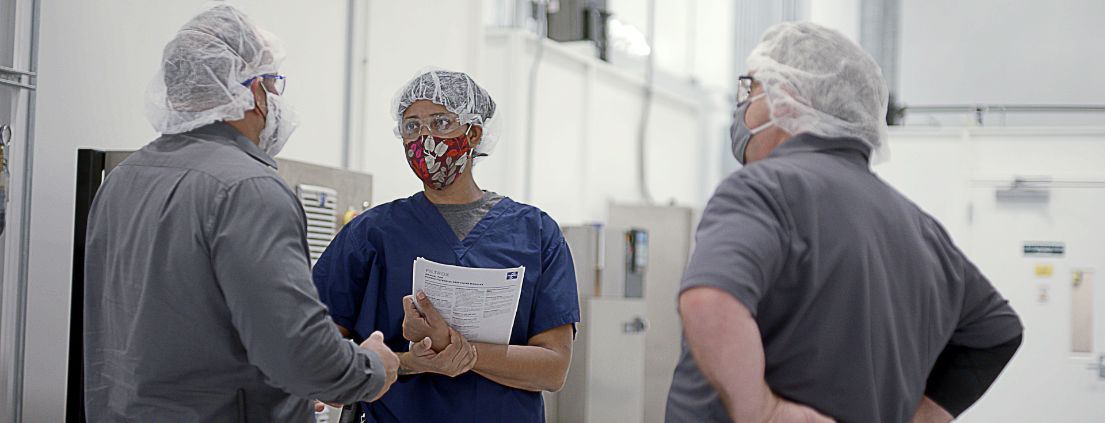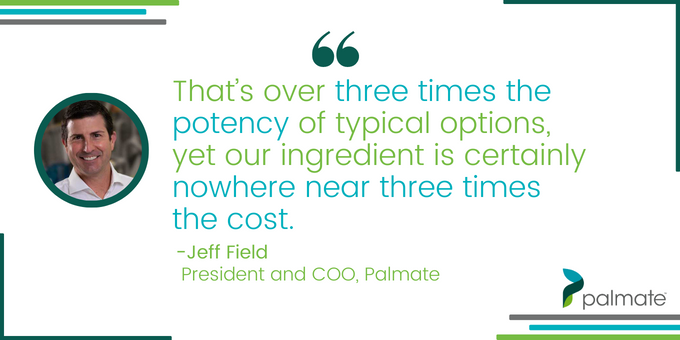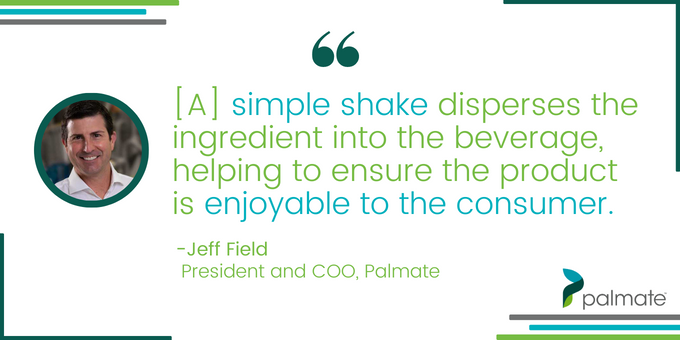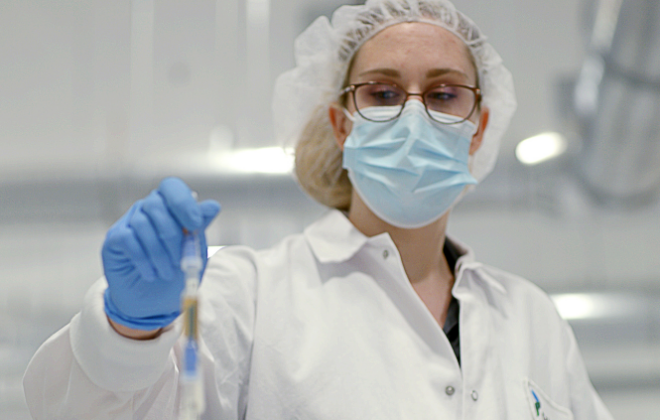
Qualifying an Ingredient Supplier for Your CBD-Infused Beverage Products: 5 Crucial Questions to Ask
How can a water-based beverage be infused with CBD consistently, accurately, and effectively? For major food and beverage companies entering the CBD space, it’s a critical question because not all water-dispersible CBD ingredients are created equal.
Winsight reports that the cannabinoid beverage market is anticipated to grow to $2.5 billion by 2026, with growth “in products ranging from seltzers and kombucha to functional/sports/performance/energy beverages, as well as nonalcoholic cocktails or spirits.”
But just how well a CBD ingredient performs in beverages like those depends on a number of crucial factors. Let’s move beyond the marketing hype around CBD-infused beverages and look at those factors, starting with the terminology.
Technically speaking: Getting the facts straight on CBD and water “solubility”
Derived from the hemp plant, cannabidiol (CBD) is an oil-based substance, making it by its very nature lipophilic (“fat loving”) and hydrophobic (“water fearing”).
So how can a CBD ingredient be truly water-soluble?
“It can’t, despite the fact that the term is commonly used in the industry,” says Jeff Field, president and COO of Palmate, a full-service hemp processor and manufacturer of premium, high-quality cannabinoid ingredients.
He explains that CBD can, however, be effectively dispersed into a water-based beverage—with the right combination of formulation and high-quality ingredients. In fact, Palmate prefers “water-dispersible” rather than “water-soluble” because it’s the most scientifically accurate term.
But regardless of the nomenclature, successfully incorporating CBD into a water-based beverage comes with unique challenges. As Field notes, “Companies who want to produce the highest quality CBD-infused beverages need to choose their CBD ingredient with the utmost care.”
Ingredients to match your high standards: What to ask your potential CBD ingredient supplier
The hemp-derived products industry is young. The Agriculture Improvement Act of 2018 exempted hemp and hemp-derived substances from the list of Schedule I drugs under the Controlled Substances Act.
Since then, cannabinoid companies have popped up across the country in a race to produce both consumable bulk ingredients and finished CBD products.
Field explains that in the case of CBD-infused beverages today, those products range widely in their overall quality and, specifically, in how well the CBD ingredient performs in key areas like these:
- Potency
- Bioavailability
- Shelf stability
- Label accuracy
- Taste neutrality
If you’re a food and beverage company vetting suppliers for your CBD-infused beverage, Field suggests asking questions like the following:
1. What is the potency of the dispersible CBD ingredient?
Water-dispersible CBD ingredients today typically have an average potency ranging from 15% – 20%, a level that’s less than ideal for a number of reasons. Chief among them is higher input costs: It takes more CBD ingredient to render the desired effect from the finished product.
But brands looking to achieve the best value have other options beyond the myriad of similar products available today.
Palmate, for example, offers a dispersible CBD powder ingredient at a significantly higher potency, ≥ 65%.

2. How bioavailable is the active CBD ingredient once the product is ingested?
Bioavailability refers to the amount of CBD that actually makes it into a consumer’s bloodstream. Unfortunately, CBD’s bioavailability can be altered by a number of factors. First and foremost is the acidic environment of the stomach.
The problem with many dispersible CBD ingredients on the market today is that they have the potential to degrade considerably once they encounter stomach acid.
However, in the case of Palmate’s high-potency dispersible CBD powder, it’s specially encapsulated so that it maintains integrity within the highly acidic pH of the stomach.
“It can then be broken down enzymatically further along the digestive tract,” explains Field, “allowing significantly greater bioavailability for absorption.”
3. How shelf-stable will the finished product be?
CBD is a naturally occurring substance that can degrade rapidly in a water-based environment if it’s not formulated properly. Therefore, in order for manufacturers to accurately dose beverages with an active ingredient like CBD, the actual product contents must have a high degree of shelf stability.
Today, more and more formulators are focused on creating emulsions, encapsulations, or other formulas that will prevent CBD from degrading as it moves through the stages of manufacturing, shipment, and distribution to ultimately sitting on a shelf.
But for most CBD ingredient companies, it’s still a significant challenge to find the sweet spot between a formulation that’s shelf-stable but also provides excellent bioavailability.

Palmate’s high-potency dispersible CBD encapsulation is extremely shelf-stable, even after many months on the shelf. Just as important, “a simple shake,” explains Field, “disperses the ingredient into the beverage, helping to ensure the product is enjoyable to the consumer.”
Moreover, our dispersible CBD powder does not include the synthetic surfactants commonly found in other options. Rather, it contains natural, Generally Recognized As Safe (GRAS) additives commonly found in a variety of food and pharma products.
4. Does the CBD ingredient enable accurate, consistent labeling?
Shelf stability and accurate labeling go hand in hand. But one of the biggest problems with CBD products today is label inaccuracy.
For example, a recent study conducted by the University of Wisconsin-Madison School of Pharmacy demonstrated just how common it is for CBD-infused beverages to reach the consumer with inaccurate labeling. Of the 21 different beverages sampled, only one was labeled accurately.
In many cases, beverages can be over-labeled, with less CBD than what the label claims. Though less common, beverages have also been found to be under-labeled, with more CBD than what the label states.
For manufacturers looking to produce a CBD-infused product with consistently accurate labeling, it’s crucial that they partner with an ingredient company who not only understands how to prevent CBD degradation; that company should also understand and implement the highest standards for food production.
Palmate, for example, is one of just a few cannabinoid ingredient companies in North America to achieve Brand Reputation through Compliance (BRC) Global Standard certification, which is recognized by the Global Food Safety Initiative (GFSI). The company’s Food Safety Program ensures that clients receive ingredients adhering to the most stringent international quality standards.
5. Is the water-dispersible CBD ingredient taste-neutral?
CBD has a naturally bitter aftertaste, an obvious problem when it comes to creating a pleasant-tasting beverage.
But potential “remedies” in the form of flavorings, sweeteners, or other flavor-masking agents are not only limited in their effectiveness; they complicate and add costs to the CBD formulation. This leads to an ingredient that’s ultimately less flexible in how it can be used.
For reasons like those, Palmate created a high-potency dispersible CBD powder that’s taste-neutral, nearly colorless, and does not contain excess fillers. It can work effectively as an ingredient in ready-to-mix beverages, beverage enhancers, or other powdered nutraceutical products.
Be ready when you need to mobilize
You’ve just learned a number of important factors to consider when choosing a dispersible CBD ingredient. So what should your next move be?
Identify a CBD partner who can provide the highest quality ingredients.

“Innovation is essential to our mission of making quality cannabinoid-infused products widely available to consumers,” says Field. “Instead of making a me-too product, we invested tremendous time and resources to develop a more potent product, which provides more flexibility and value for the brands creating quality CBD products.”
Along with being an ingredient innovator, Palmate holds itself to a higher standard of food safety and quality—for our manufacturer partners, for the retailers who carry their products, and ultimately for the consumers who buy them.
Wondering how Palmate can provide cannabinoid ingredients that unleash the full potential of your products?
Recent Posts
- 7 Questions to Help You Find a Trustworthy CBD Ingredient Company
- Why CBD Companies Should Re-Examine Their Marketing Content—NOW
- Qualifying an Ingredient Supplier for Your CBD-Infused Beverage Products: 5 Crucial Questions to Ask
- The Logical Leap: 5 Reasons Why You Should Integrate CBD into Your Business
- GFSI-Recognized Certification: How Cannabinoid Ingredient Suppliers Can Help Manufacturers Succeed
Categories
- Best Practices (4)
- CBD and Business (3)
- Certifications (1)



